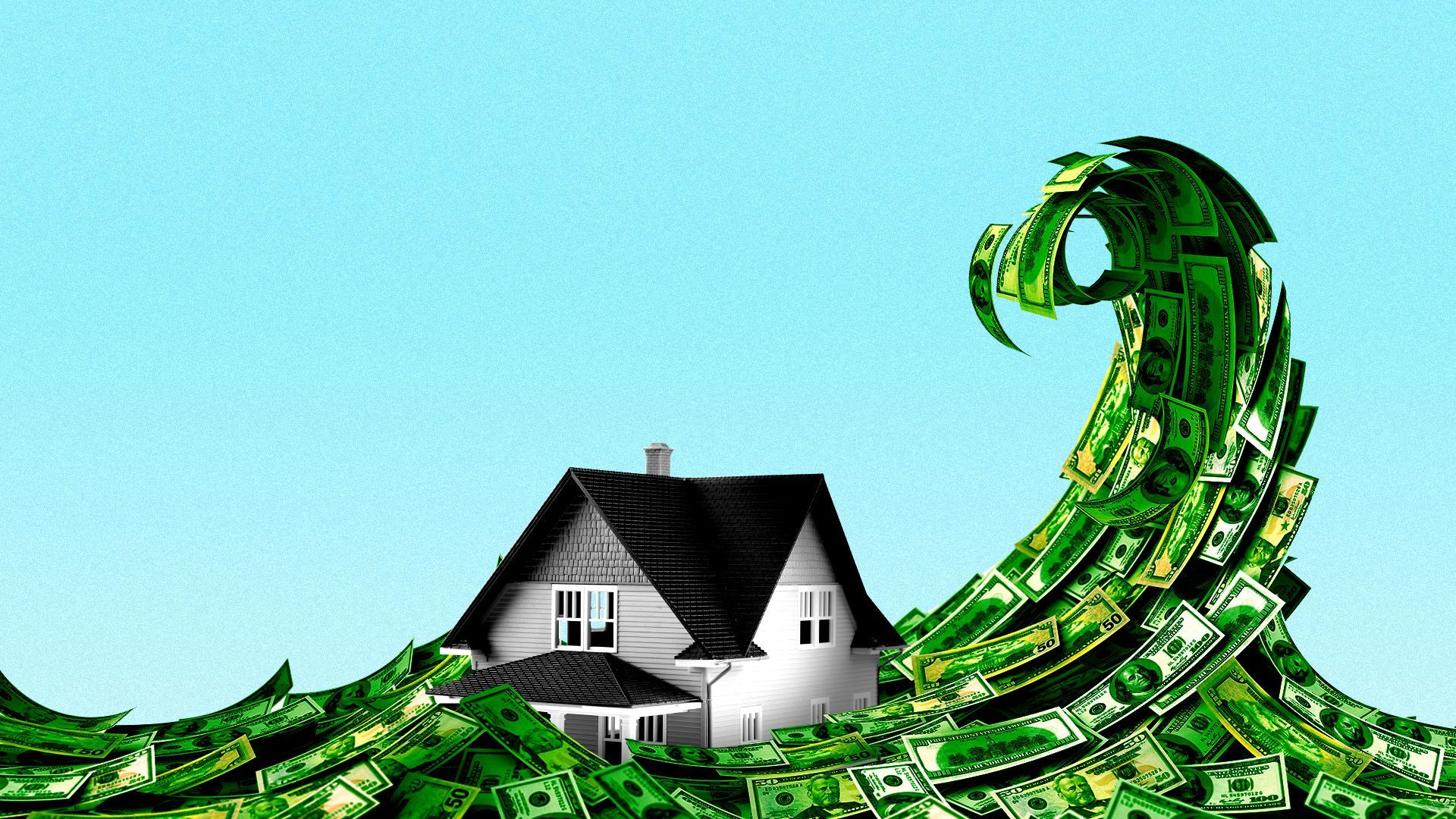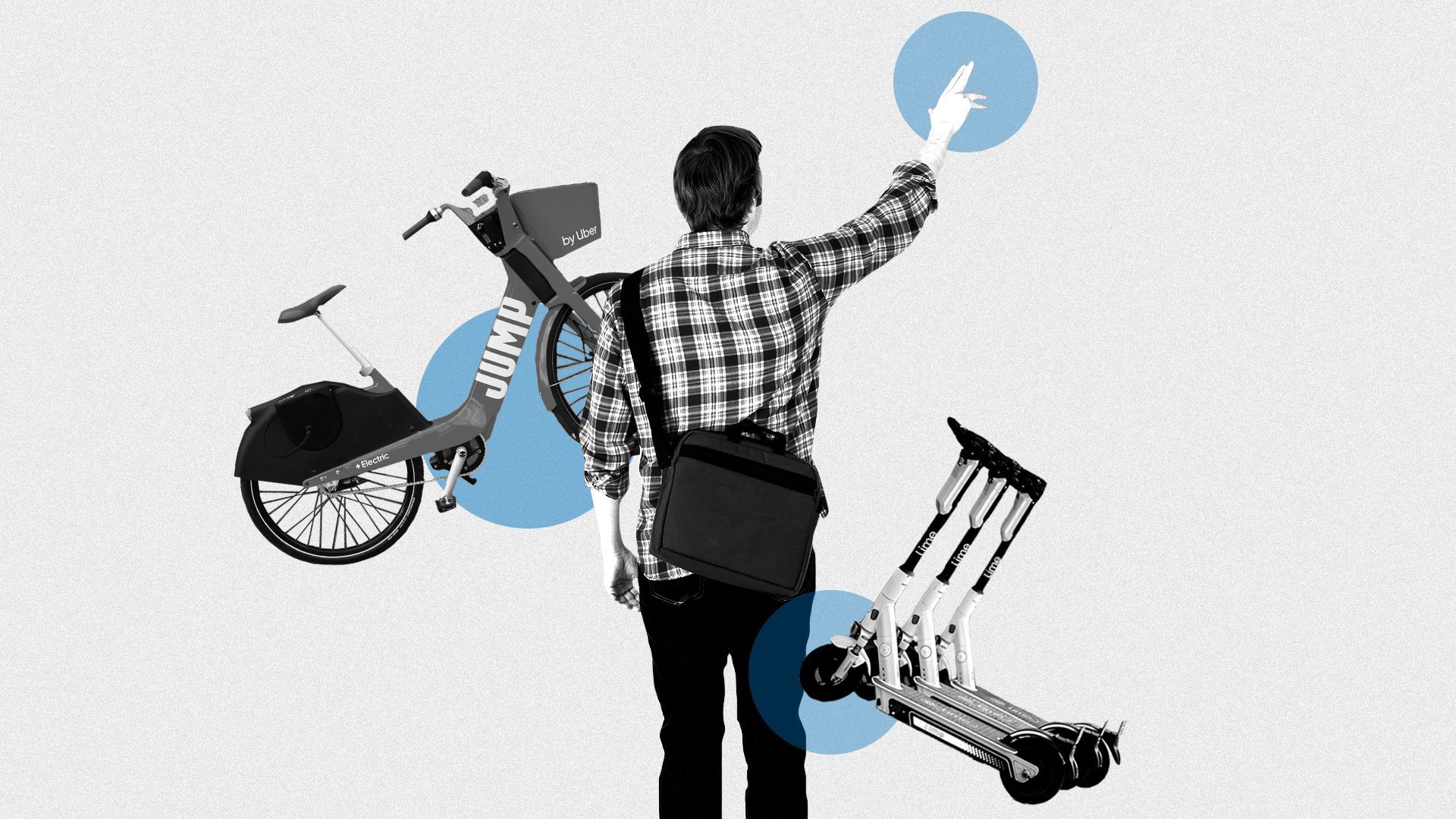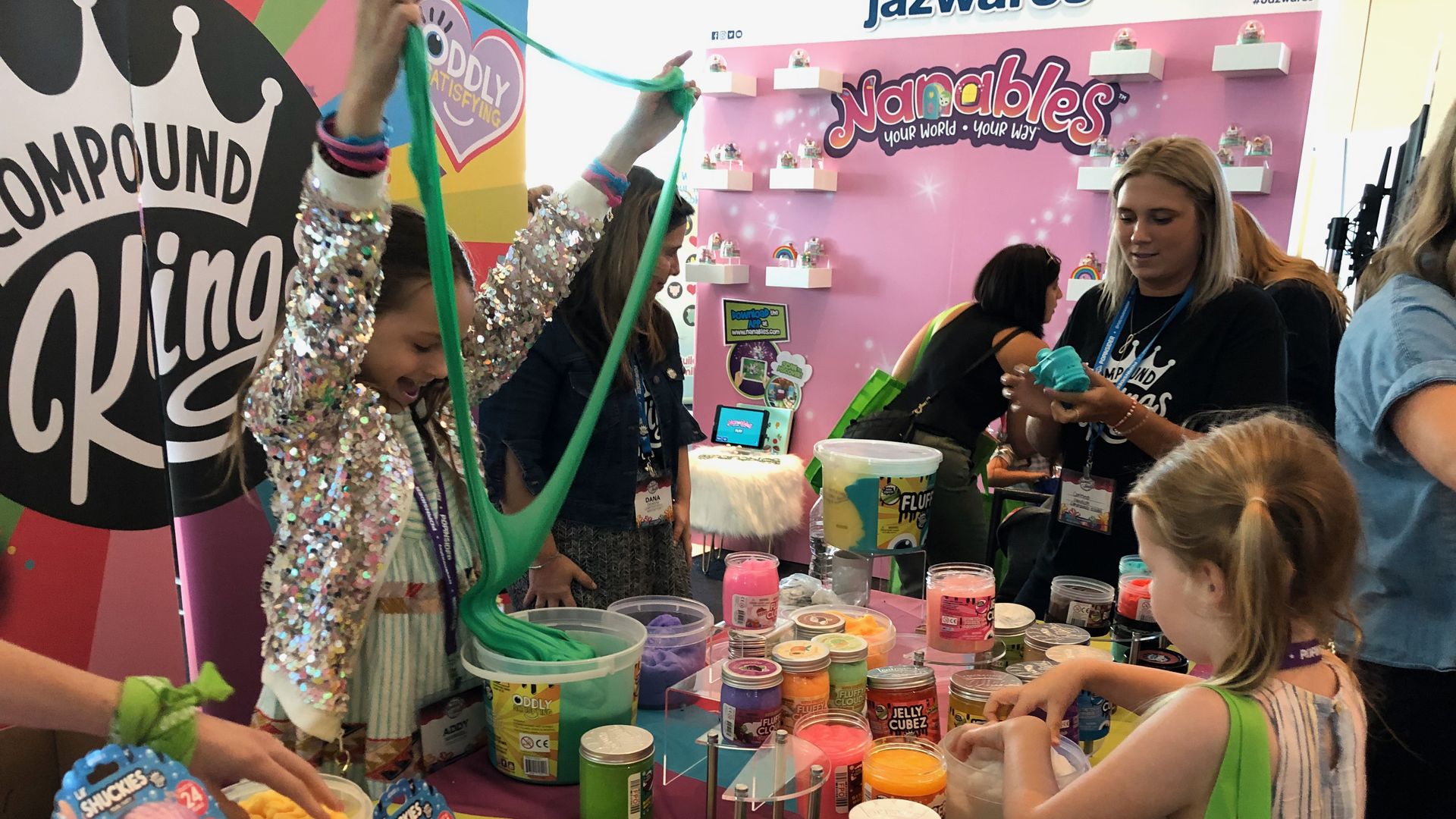| | | | | | | Presented By OurCrowd | | | | Axios Cities | | By Jennifer A. Kingson ·Nov 12, 2020 | | Well, you've spoken: Axios Cities readers are not fans of e-scooters. "The 'e-' in e-scooter stands for eyesore," wrote one reader in Cleveland. More opinions below. - Today's newsletter is 1,353 words, a 5-minute read. I'd welcome your thoughts on it — write to me at jennifer@axios.com.
Situational awareness: Smart Cities Dive has been keeping a running tally of which mayors got elected in U.S cities last week. - "Phoenix and Portland, Oregon, are among those that will maintain incumbent mayors while Baltimore and Honolulu welcome new leaders."
| | | | | | 1 big thing: Foreign cash comes for U.S. real estate |  | | | Illustration: Aïda Amer/Axios | | | | There's huge pent-up demand among wealthy foreigners to buy property in New York, Los Angeles, San Francisco and other cities — and some investors began calling their money managers as soon as Joe Biden's victory was announced. Why it matters: Cities whose economies are withering under the coronavirus may see a fresh jolt of life from the high-end real estate sector in 2021 and beyond, with money from abroad creating new jobs and business opportunities. Driving the news: It's been a terrible year for commercial real estate. Foreigners who covet prized properties have been sitting on the sidelines — not only because of the pandemic and travel restrictions, but also because of the Trump administration's hard line on immigration and foreign ownership of U.S. assets. - The situation seems to be thawing instantly. Overseas investors are sending out queries for both commercial and residential properties, according to lawyers and asset managers who serve this customer base.
- Wealthy foreign families are again starting to shop for high-end homes for their children who want to study or work in the U.S.
- Foreign investors are suddenly making inquiries about the types of properties that the pandemic has practically left for dead: office buildings, retail centers, hotels and hospitality complexes.
What they're saying: 'There's very much an optimistic feel in the air," says Edward Mermelstein, CEO and founder of One & Only Holdings, a luxury real estate investment consulting firm in New York that caters to foreign nationals. - "Everyone is looking at the United States," he said. "All the high net worth families that we've been speaking to in the last few weeks have been saying this in unison."
Yes, but: The "ifs" involve whether there is protracted wrangling over succession at the White House and whether Congress can pass a big stimulus bill. - Federal stimulus dollars would act as a welcome mat for foreigners seeking real estate deals.
- The Federal Reserve's successful actions to backstop the economy have heartened foreign buyers through the thick of the pandemic.
- Such buyers typically pay top dollar and stick to the big cities they're familiar with rather than venturing into smaller markets or the heartland.
What to watch: Expect to see a surge in applications for EB-5 visas, which allow foreign nationals to get green cards if they invest enough money in certain business ventures that create jobs for Americans. - "We had half a dozen people who were just waiting" to see the election results before seeking an EB-5 visa, said Mona Shah, head of the law firm Mona Shah & Associates Global, which specializes in this visa category. "People are willing to come in and invest in the United States again."
Go deeper |     | | | | | | 2. The great e-scooter debate, part 2 |  | | | Illustration: Aïda Amer/Axios | | | | Last week, I wrote about how e-scooters are finally coming to New York City — at least, to the four boroughs other than Manhattan — and asked readers what they thought. What you said: "I hate 'em!" said one reader in a three-word email — and others expressed similar sentiments. - A reader who said he drove "taxi/limo/Lyft in Denver" says he can live with bikes — even though they seldom follow traffic rules — but e-scooters are too unpredictable and their riders never pay attention.
- Some readers begged for tighter rules about where e-scooters are allowed. "Walkers can't safely share the sidewalk with a powered metal object traveling 10-20 mph and carrying an adult," one said.
- One person noted that the elderly don't stand a chance against phalanxes of scooter-wielding millennials. (She suggested deploying urban "e-walkers" to give older people an edge.)
The mess factor: "I spend part of my time in Santa Monica, California, where dockless scooters spread like wildfire last year," one reader said. "If you tell people, 'leave it anywhere,' they will take you at your word." - In his experience, "Scooters were left in driveways, blocking pedestrian paths in intersections, on private property — literally, anywhere."
Where it stands: It's unclear if New York will require docks for its e-scooter pilot. The city's Request for Expressions of Interest only specifies that "batteries for e-scooters must not be charged or serviced in residences." The bottom line: Like it or not, e-scooters are taking root and expanding in cities everywhere, so learning to live harmoniously with them may be more a matter of "how" and not "if." - Then again, safety issues and public backlash — plus busier streets when the pandemic eventually fades — could turn the tide.
|     | | | | | | 3. The most (and least) pandemic-proof cities |  | | | Illustration: Annelise Capossela/Axios | | | | Cities that draw their lifeblood from information technology (like San Jose), life science (Boston) and defense (Washington, D.C.) are "best positioned for resilience," as COVID-19 runs its course, according to a new report. Why it matters: In the near term, as the vicissitudes of the pandemic continue to ravage people's livelihoods in various cities, real estate investors are placing bets on places that rely on noncyclical industries. Where it stands: The report, issued by Nuveen Real Estate, sees uncertain times ahead for real estate in cities like Chicago and New York, but concludes that many factors — like the length and severity of the pandemic, and the government's ongoing response — make things hard to predict. - "We're heavily invested in Boston and San Diego, and some of the larger life science markets across the country," Carly Tripp, chief investment officer at Nuveen Real Estate, tells Axios.
- Tripp says she's seen "complete bifurcation" between San Jose and San Francisco, with people moving out of the Bay Area but staying put in the San Jose area.
- Real estate in cities that rely heavily on tourism and hospitality (like New Orleans and Las Vegas), energy (Oklahoma City) and retail (Miami) could fare the worst, the report says.
Of note: Tripp anticipates the effects of the pandemic will be "relatively short-lived," meaning less than three years — too short for underdog cities to diversify their industries, but not so long that they can't ride things out. |     | | | | | | A message from OurCrowd | | Accurate, autonomous harvesting may save billions. You can invest now | | |  | | | | OurCrowd is opening the door for you to invest in the next great ag innovation. Tevel's Flying Autonomous Robots use cutting-edge AI, 3D-imaging and proprietary algorithms to harvest fruit fast - potentially saving the ag industry billions. Explore Tevel's investment potential. | | | | | | 4. Demographic trends that explain Biden's victory |  | | | Illustration: Aïda Amer/Axios | | | | Geography, rather than race or age, paints the clearest picture of President Trump's defeat and illustrates the demographic trends that could hurt Republicans in future elections, Axios' Neal Rothschild and Stef W. Kight write. The big picture: The rural-urban divide demonstrated President-elect Joe Biden's power in and around cities — which helped him flip the states that delivered his election victory. Here are four geographic and demographic trends that help explain the election outcome: - Suburbs have undergone a fundamental shift in favor of Democrats. Trump may have alienated some suburban voters in ways that wouldn't translate to other Republicans — but suburban demographics are also rapidly changing, and not benefitting the GOP.
- Blue areas got even bluer, while rural areas dug in for Trump.
- The white working-class vote in the Midwest did not deliver victory for Biden, even though that was one of his key selling points in the Democratic primary.
- Latino support for Trump grew in a number of key regions — not just in Miami. The results highlight the complexity and diversity of the Latino vote in the U.S.
Go deeper |     | | | | | | 5. 1 fun (non-cities) thing — toys |  | | | Pre-pandemic, I used to check out toy industry trade shows like this one in Manhattan in 2019. Photo: Jennifer A. Kingson | | | | "COVID-19 had a very unexpected side effect, which is that toy sales are booming," James Zahn, who edits industry trade publications like The Toy Insider, told me recently. Why it matters: The abrupt liquidation of Toys "R" Us in 2018 pushed the toy business into a tailspin (and me into mourning, as I'm a huge toy lover.) What's new: As the pandemic set in, cabin fever sent parents, kids and young adults tearing through whatever toy aisles they could find, snapping up everything on the shelves. - U.S. toy industry dollar sales rose 19.1% to $13.7 billion in the first three quarters of 2020, according to the NPD Group.
- Puzzles, board games and screen-free toys are at a premium, given that so many kids spend all day on their laptops.
- Traditional games like Monopoly, Clue and Uno are still hugely popular, and STEM-related toys are having a renaissance. (Fans of science and chemistry sets can check out this piece I wrote about them.)
- Big holiday trends include collectible dolls and toys that can be entertainingly "unboxed," or removed from their wrappings.
The bottom line: "Despite all the bad stuff that has happened this year, families are reconnecting and relearning how to play with one another," Zahn says. |     | | | | | | A message from OurCrowd | | Billions may no longer be left to rot. Early investing is open | | |  | | | | Every year farmers lose billions of dollars when fruit is left to rot. Tevel's Flying Autonomous Robots deploy on-demand, harvesting fruit at its peak value, accurately and efficiently. Now, you have the chance to invest early. Explore Tevel's billion-dollar potential on OurCrowd. | | | | My bad: In an article last week about the National Multifamily Housing Council's rent payment tracker, I misstated one of the group's positions. It favors ending evictions moratoria (not "extending" them). The corrected item lives here. I regret the error. Know someone who likes e-scooters? Get them to sign up for Axios Cities here. | | | | Axios thanks our partners for supporting our newsletters.
Sponsorship has no influence on editorial content. Axios, 3100 Clarendon Blvd, Suite 1300, Arlington VA 22201 | | | You received this email because you signed up for newsletters from Axios.
Change your preferences or unsubscribe here. | | | Was this email forwarded to you?
Sign up now to get Axios in your inbox. | | | | Follow Axios on social media:    | | | | | |









No comments:
Post a Comment